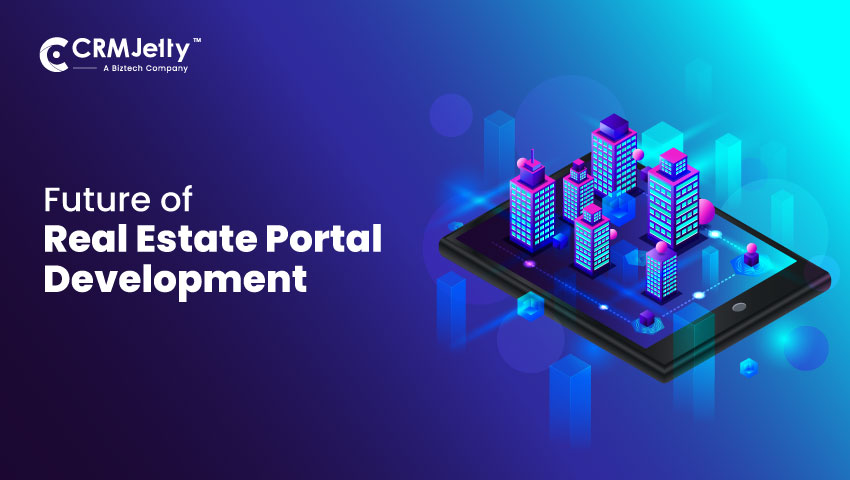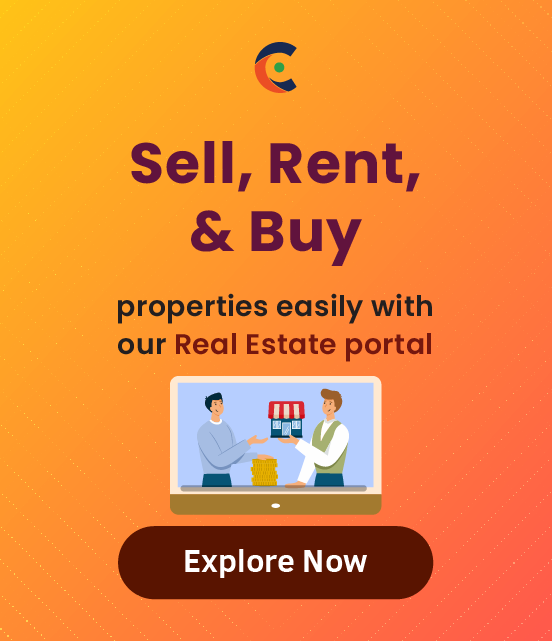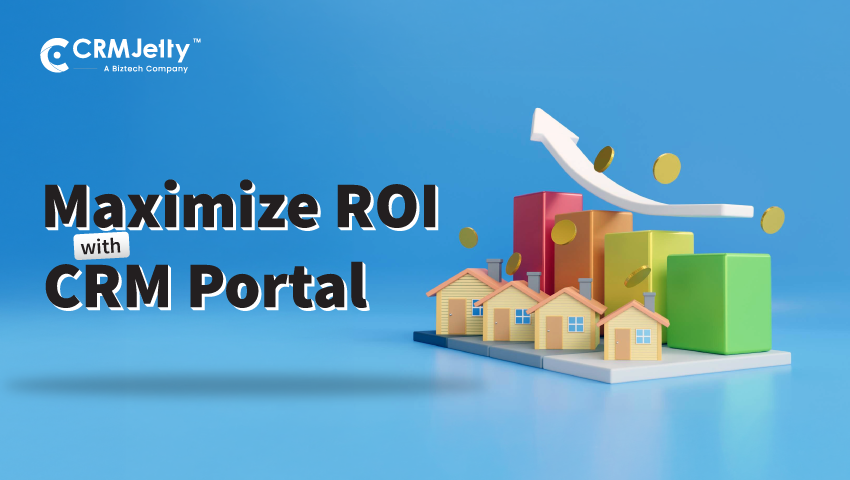There are more than two million real estate agents in the United States alone. The real estate industry is a thriving industry with good opportunities to venture into. There are, however, some changes that almost all the industries across the globe are witnessing since the advent of the digital era.
Websites are replacing traditional brick-and-mortar real estate companies’ offices, virtual tours of properties are replacing in-person visits, and online work is replacing traditional paperwork. Simply put, virtually everything is going online.
Well, here’s just one aspect of the scenario. The whole story is – merely going online doesn’t suffice today. The need to “revolutionize” the already started digital revolution is on the rise. Hence, the percentage of companies adopting the real estate portal solutions is going through the roof.
Yes, you heard it right. Real estate portal development – that’s the future of the real estate industry. What makes this real estate portal stand out from a simple real estate website? Well, this is what you are going to find out in this post. You’ll learn about the challenges that a real estate portal can help surmount and the features it must provide.
What is a Real Estate Web Portal?
A real estate web portal is an advanced digital platform that connects buyers, sellers, brokers, and property managers through a single, unified interface. Unlike traditional real estate websites, which often focus on property listings alone, a web portal integrates a variety of features and tools, enabling seamless transactions and enhanced customer experiences. Users can list properties, browse available listings, schedule tours, and even communicate with agents—all from within the portal. These platforms typically include advanced search filters, interactive maps, and other tools that simplify the process of buying, selling, renting, or leasing properties.
Challenges and Solutions in Real Estate Web Portal Development
There are two key advantages that can be derived from real estate web portal, but creating and maintaining such sites has its own problems as well.
1. Data Accuracy and Consistency
The problem of property listings’ reliability and uniformity is one of the greatest tasks for real estate sites. With multiple users adding new properties, there is a risk of displaying outdated or incorrect information.
Solution: Implementing a robust CMS with verification features can help. Admins can verify and approve listings before they go live. Additionally, automating data updates through integration with property databases can keep listings current in real-time.
2. User Experience and Interface Design
There is so much pressure for the website to be easy to use and intuitive. In this case, an ideal real estate portal should be simple looking and easy to use to avoid making visitors leave the site before finding the property that they are interested in.
Solution: Clean, simple and responsive design should be the norm over complex and cluttered design. Using clear filters, detailed descriptions of the properties and great pictures of the properties. Implementing an efficient search tool and user-centered usability interface design will significantly improve user satisfaction.
3. Security Concerns
Because many pieces of personal data are exchanged—phone numbers, addresses, banking details, and other legal documents—security remains a critical issue for both parties involved in development.
Solution: Ensure robust encryption and compliance with data protection regulations. The user must be authorized to access the application by practicing two-factor authentication upon login and ensuring secure payment methods for any money transactions needed in the application. Regular security audits and updates should also be a part of the portal’s maintenance to prevent cyber threats.
4. Compatibility with Third Party Interfaces
Real estate portal often need to integrate with third-party tools like payment gateways, CRM systems, or property management software. Integrating these systems seamlessly can be challenging, particularly if the systems are not designed to work together.
Solution: Using flexible APIs and ensuring compatibility with various platforms can simplify integrations. A well-designed API strategy will enable smooth data exchange between systems, making the portal more effective in managing transactions and user relationships.
5. Mobile Optimization
With a massive emphasis on mobile, it is important that your real estate portal works effectively on mobiles and tablets.Many users access property listings on-the-go, and a portal that’s not optimized for mobile can result in a poor user experience.
Solution: Develop your real estate portal using responsive web design, which ensures that the platform adjusts its layout and content based on the device’s screen size. Offering a mobile app version of the portal can further enhance user engagement and accessibility.
Benefits of Real Estate Web Portal Development for Your Real Estate Business
Rich Customers’ Database
Building a real estate portal helps you get access to an extensive database of customers. Customers can easily register their profiles, details, preferences, and more on your portal. There is no need to meet every prospect or customer in person or call or email them for their details. Customers can do it all by themselves, making their experience better and reducing your employees’ data entry and management work. Moreover, as people find it easy to register and enter their details via your portal, it helps gain more customers in less time. The more the prospects and customers, the higher the sales are.
Easy Verification and Full Transparency
With a real estate portal, the verification process becomes easier and faster. You can simply ask for different proprietors and realtors to upload relevant documents like property papers, personal identity verification documents, etc., via the portal. You can also sign deals with new brokers and agents and onboard them via online contract agreements. This helps eliminate the hassle of manual onboarding and verification of profiles also helps increase your company’s authenticity and credibility.
Hassle-Free Property Management
With all the options to manage property details, edit them, and remove or add properties, a real estate portal makes your work easier and smoother. You can always create, modify, and update your existing property listings on the go as and when needed. There is no need to maintain separate spreadsheets or paper files to track properties and edit details.
Optimized Processes
With all your proprietors’, agents’, and customers’ details centralized, it becomes easier to manage business processes. Buyers and sellers can contact you online instantly and input their inquiries or concerns via the portal. Further, you can view and manage property listings in various locations across the country right from within the portal. This helps you not only optimize your management process but also faster and more efficiently.
Helps Brand Building
Small local real estate agents and business owners often look for ways to establish themselves as brands in their location. When you launch a real estate portal, people will start knowing you over time when you sell, lease, and rent out properties. They will connect with you and spread a good word if they find your services up to the mark. This will help you build your brand rapport and expand your outreach beyond your region, over time.
Helps Attract and Manage Leads
There were times when realtors would invest huge sums of money in yellow pages, offline ads, and pamphlets to bring prospects to their physical offices. Times have changed now, and a real estate portal does that for you at a much lower cost. People simply look for information about properties in an area online.
A real estate portal proves to be of great help in acquiring leads easily and crack deals. This is because you can see everything right from customers details, locations, to their budget expectations centrally. Accordingly, you can suggest properties and retarget them if they don’t close the deals immediately.
This helps you attract more leads and increase your chances of sales and revenue.
Boost Search Engine Visibility
A real estate portal also helps you increase your brand awareness and visibility. By promoting your portal across various channels, you can drive traffic to it. If your new visitors like your portal, they may also visit your website and know more about you.
It indirectly helps your brand visibility and outreach as people know your website, work, and success stories on your website.
Enhanced Customer Experience
When you suggest what customers want, it helps you enhance the customer experience. You can provide various filters like price, location, type of property, lease/rent/buy, etc. This helps your customers narrow down their choices instead of wading through huge property listings. Further, they can also add properties they like to wish list, save their profiles, and request a virtual tour. These all features help take your customer experience to the next level.
Six Trends in Real Estate Web Portal Development
With the advancement in technology the real estate sector is also striving to cater to the expectations while trying out the new opportunities. Here are the key trends shaping the future of real estate web portal development:
1. AI-Driven Property Recommendations
The new technologies and Artificial Intelligence are getting prominence in determining the user experience for the real estate portal. When using AI, one can identify users’ behavior, their preferences and search history to come up with relevant recommendations. All these intelligent suggestions enhance the utility of the services and enhance the probability of business transactions.
2. Virtual and Augmented Reality (VR/AR) Integration
Virtual and augmented reality are the new trends regarding property presentation. Today, real estate portal are mostly providing tours that enshrine the ability of prospective buyers and tenants to tour various properties without leaving their homes. With the help of augmented reality features, people are now able to see the further improvements or analyze where the furniture has to be placed later.
3. Blockchain for Secure Transactions
Blockchain technology is being applied to fix problems of transparency and trust in property transactions. Smart contracts also help to facilitate processes of property exchange, payments, and document authentication within the frameworks of a portal. Blockchain also reduces the risk of fraud by maintaining an immutable record of transactions.
4. IoT Integration
The Internet of Things (IoT) is enabling real-time data collection and analysis for properties. Future real estate portal will integrate IoT devices to provide insights such as energy efficiency, security features, and maintenance needs. This adds value for buyers and renters, offering a deeper understanding of the properties they are considering.
5. Integration with Smart City Initiatives
Evolution to smart cities is already on the horizon, so real estate portal will begin to merge with these systems. Users will be able to access detailed information about neighborhoods, including infrastructure, amenities, and connectivity, making it easier to choose properties in line with their lifestyle and preferences.
6. Hyper-Personalization
Future portals will focus on delivering hyper-personalized experiences. This includes dynamic search filters, tailored recommendations, and customizable dashboards that adapt to individual user needs and preferences.
Must-Have Features of a Real Estate Portal
There are a few essential features a real estate portal must have as follows.
A. For Admin
- Custom DashboardA real estate portal should allow you to manage all your actions from a central well-arranged custom dashboard. It should allow control entities and track analytics with the admin dashboard.
- User ManagementThe portal should offer comprehensive user management where the admin can manage all the users, including sellers, brokers, customers, etc. It should give freedom to add, edit, and delete user profiles.
- Simplified Property ListingsThe admin should be able to add, edit, delete, approve, and reject the properties the brokers, proprietors, or sellers add based on their decided criteria.
- Role-based AccessThe portal should let the admin create various user groups and provide them with a secure access to different entities based on their roles.
- Documentation ManagementThe admin should get to execute the documentation process smoothly. The portal should save and approve legal property documents, identity proofs, etc., from both sellers and customers.
B. For Agents/Sellers/Brokers
- Profile ManagementThe portal should allow brokers, agents, and proprietors to manage their profiles and details like name, contact, properties listed, and documents.
- Media ManagementThe portal should allow the agents to add high-quality property photos, videos, and HD quality 3D and VR tours to give details more elaborately.
- Analytics and Performance TrackingBrokers and sellers should be able to view analytics and get insights into property pages. The portal should let them view total visits, daily traffic, clicks, wish lists, and more.
- Multi-Channel Communication ManagementThere should be the freedom for customers to connect with the brokers and proprietors in real-time via multiple channels, including live chat, contact us forms, emails, etc.
C. For Customers
- Geo-Location Based SearchThe customers should get to navigate properties visually on a map to get a better understanding of their surroundings. They should also be able to search properties based on their current location by turning on GPS.
- Smart CategorizationThere should be an implementation of an exhaustive categorization of properties. There should be categories based on the type of property, number of rooms, balcony, and other amenities. There should be an option to search the property by filters like location, price range, etc.
- Support for Wishlisting PropertiesThe portal should offer the option to create a wishlist to go back to any time in the future and save the hassle of searching the properties all over again.
- Multi-channel CommunicationThere should be a provision for multi-channel communication. Buyers should be able to contact agents and proprietors via any medium of their preference.
- Tour Scheduling The portal should let buyers schedule in-person visits from within the portal. They should also get the option to choose between virtual tours and in-person tours as per their preference.
- Mobile FriendlinessThe portal should be fully responsive to give users the ease of accessing it and carrying out activities they want.
How CRMJetty Can Help You Build a Reliable Real Estate Web Portal
Now you know how a real estate portal has revolutionized the real estate industry. It is time you created a portal if you are also in the real estate business. If you are looking for a fast way to launch your portal and start hitting high sales figures, CRMJetty can be your best real estate portal development partner.
CRMJetty provides a ready-to-integrate portal solution for real estate that you can also customize as per your requirements. Further, we also offer custom development services on demand based on your business plan and goals. With over 14 years of experience in portal development, we assure you of the best and all-inclusive portal development services for your business.
So, let’s connect to grow your business!
Frequently Asked Questions
1. What is a real estate web portal?
A real estate web portal allows users to buy, sell, rent, or lease properties. It connects buyers, sellers, agents, and brokers, providing features like property listings, virtual tours, advanced search filters, and secure transaction options.
2. How does a real estate portal benefit my business?
A real estate portal streamlines property management, enhances customer experience, attracts more leads, and increases sales. It helps you build your brand, manage data efficiently, and stay competitive in the digital market.
Check out how US Housing Consultants enhanced case management
3. What features should a real estate portal have?
A comprehensive portal should include:
- Advanced property search and filters
- Virtual and augmented reality tours
- User profiles for buyers, sellers, and agents
- Secure document and transaction management
- Mobile-friendly design and multi-channel communication
4. How secure are real estate portal for transactions?
Security is a critical focus in real estate portal development. With encryption, two-factor authentication, and compliance with data protection standards (like GDPR), transactions and user data can be kept secure. Integration of blockchain technology further enhances transparency and reduces fraud.
5. What is the cost of developing a real estate web portal?
The cost depends on factors such as the complexity of features, design requirements, technology stack, and customization needs. A basic portal might cost less, while advanced portal with features like AI and VR may require a higher investment.
6. Can a real estate portal integrate with other tools and platforms?
Yes, real estate portal can integrate with tools like CRM systems, payment gateways, MLS databases, and marketing automation software. Integration ensures seamless data flow and efficient operations.
7. Do I need a mobile app for my real estate portal?
A mobile app is highly recommended, as many users access real estate platforms via their smartphones. Apps can offer features like push notifications, geo-location-based searches, and offline access, enhancing user engagement.
8. Can I customize the portal to fit my business needs?
Absolutely! CRMJetty Real Estate Portal can be tailored to your specific requirements, including custom branding, unique features, and integrations aligned with your business goals. Contact us for more details.
All product and company names are trademarks™, registered® or copyright© trademarks of their respective holders. Use of them does not imply any affiliation with or endorsement by them.







